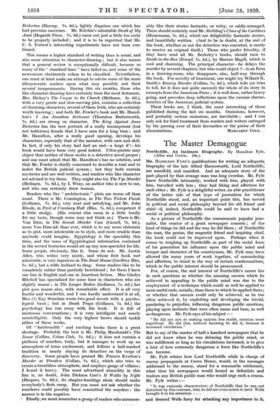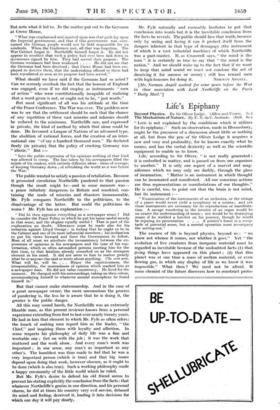The Master Demagogue
Northcliffe, An Intimate Biography. By Hamilton FyTe. ( Allen and Unwin. 16s.).
MR. HAMILTON FYFE'S qualifications for writing an adequate biography of the late Alfred Harmsworth, Lord Northcliffe, are manifold, and manifest. And an adequate story of the part played by that strange man was long overdue. Mr. Fyfe knew Northcliffe intimately, worked with him, played with
him, travelled with him ; they had liking and affection for each other;' Mr. Fyfe is a delightful writer, an able practitioner of the better side of that type of journalism for which Northcliffe stood, and, an important point this, has moved in political and social philosophy beyond his old friend and chief—if, indeed, Northcliffe could be said to have had a social or political philosophy.
As a picture of Northcliffe the consummate popular jour- nalist, the creator of a great newspaper concern ; of the kind of things he did and the way he did them ; of Northcliffe the man, the genius, the magnetic friend and inspiring chief; the book could not be improved upon. Perhaps when it comes to weighing up Northcliffe as part of the social force of his generation his influence upon the public mind and temper and character of his countrymen, Mr. Fyfe may have allowed the many years of work together, of comradeship and affection, to stand in the way of certain condemnations; which in the public interest should be pronounced.
For, of course, the real interest of Northcliffe's career lies in such questions as whether the amazing success which he achieved in appealing to the public mind was due to the employment of a technique which could as well be applied to more useful ends, socially, than those to which he applied them; or whether that success could only be achieved, as he too often achieved it, by exploiting and developing the trivial, pandering to prejudice, inflaming dangerous public emotions, playing upon instincts that were often mean and base, as well as dangerous. Mr. Fyfe says of his subject :—
"He did not aim at making opinion less stable, emotion more superficial. He did this, without knowing he did it, because it increased circulation."
But to say of the master of half a hundred newspapers that he did not know when he was debasing the public mind, or was indifferent so long as his circulations increased, is to give a hint of how extremely dangerous a force like Northcliffe's can become.
Mr. Fyfe relates how Lord Northcliffe while in charge of enemy propaganda at Crewe House, would, in the messages addressed to the enemy, stand for a reasonable settlement, what time his newspapers would hound as defeatists and traitors any British public man who would urge such a course. Mr. Fyfe writes :—
"It was curiously characteristic of Northcliffe that he was not disturbed by this contrast, that he did not even notioe, it until Wells brought it to his attention . . . - and deemed Wells fussy for attaching any importance to it.
But note what it led to. In the matter put out to the Germans at Crewe House,
"What was emphasised and insisted upon was that guilt lay upon the Imperial government, and that if this government was over- turned the German people would not be held responsible for its misdeeds. When the Conference met, all that was forgotten. The War Cabinet forgot' it. Northcliffe himself forgot it. He did not appear to recollect that such a policy had ever been laid down in documents signed by him. They had served their purpose. The German resistance had been weakened . . . . He did not see that the Germans had been deceived ; that Crewe House had been em- ployed to deceive them, that the undertaking offered to them had been repudiated as soon as its purpose had been served."
What should we have said if the Germans had so acted ? Can we serenely overlook the fact that the honour of England was engaged, even if we did employ as instruments "men of action" who were constitutionally incapable of realizing that a word given is not, or ought not to be "just words." But most significant of all was his attitude at the time of the Peace Conference. The War was over. The problem now was to see that the settlement should be such that the chance of any repetition of these vast miseries and infamies should be reduced to the minimum. Northcliffe saw, and expressed in private, the kind of method by which that alone could be done. He favoured a League of Nations of an advanced type, the abolition of national forces, and the creation of an inter- national one "of say a hundred thousand men." He declared freely (in private) that the policy of crushing Germany was " idiotic." But :—
" Into the public expression of his opinions nothing of that kind was allowed to creep. The line taken by his newspapers filled the niinds of his readers, with entirely different ideas—ideas of revenge, of keeping Germany down ; of rebuilding the world as it was before the War.' .
The public wanted to satisfy .a passion of retaliation. Because
it promoted circulation Northcliffe pandered to that passion though the result might be—and in some measure was—
a peace infinitely dangerous to Britain and mankind, con- taining the seeds of miseries and disasters immeasurable. Mr. Fyfe compares Northcliffe to the politicians, to the disadvantage of the latter. But could the politicians do worse ? Mr. Fyfe has an explanation
"Did he then appraise everything as a newspaper stunt ? Did he ,consider the Peace Policy to which he put his name useful merely in that sense, and the slogans equally useful ? That is part of the explanation no doubt. Allowance must be made also for his irritation against Lloyd George • in feeling that he ought to be in the Cabinet and one of its most influential members ; his inclination to put his views forward and force the Government to follow. Most of all must we attribute the inconsistency between the ex- pressions of opinions in his newspapers and the tone of his con- versation, which so often astonished persons meeting him for the first time, to that fatalism already remarked on as the strongest element in his mind. It did not seem to him to matter greatly what he or anyone else said or wrote about anything. (The sera sera. What will be, will be. . . . Hence the capriciousness, the irresponsibility, the unsteadiness of opinion which marked him as a newspaper man.. He did not value consistency. He lived for the moment. He changed with his surroundings, taking on their colour, accommodating himself to whatever mental atmosphere he found himself in."
But that cannot make statesmanship. And in the case of a great newspaper owner, the more unconscious the process of pandering is, the less he is aware that he is doing it, the greater is the public danger.
All this may sound harsh, for Northcliffe was an extremely likeable man, as this present reviewer knows from a personal experience extending from first to last over nearly twenty years. He had in him that element to which Mr. Fyfe so often refers : the knack of making men regard him as the leader, "the Chief," and inspiring them with loyalty and affection. In some respects his philosophy of daily life was a fine and workable one : Get on with the job ; it was the work that Mattered and the work alone. And every man's work was important ; in one sense, any man's as important as any other's. The humblest was thus made to feel that he was a very important person (which is true) and that big issues depend upon doing that work, however obscure, as it ought to be done (which is also true). Such a working philosophy made
a happy community of the little world which he ruled.
But Mr. Fyfe's desire to defend his old friend seems to prevent his stating explicitly the conclusion from the facts : that whatever Northcliffe's genius in one direction, and his personal charm, he did at times his country very evil service, debased its mind and feeling, deceived it, leading it into decisions for *kWh one day it will pay deatly. Mr. Fyfe naturally and excusably hesitates to put that conclusion into words but it is the inevitable conclusion front the facts he reveals. The public should face that truth, because only by seeing and facing it can it protect itself from the dangers inherent in that type of demagogy (the instrument of which is a vast industrial machine) of which Northcliffe was a past-master. If, as Cromwell says, "the mind is the man" it is certainly as true to say that "the mind is the nation." And we should wake up to the fact that if we want to keep that mind sound we must not condone the act of deceiving it for success or money; still less reward men
with high honours for doing it. NORMAN ANGELL. [Mr. Norman Angell worked for some years before the War in close association with Lord Northcliffe oil the Paris "Daily Mail."]



















































 Previous page
Previous page